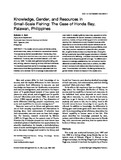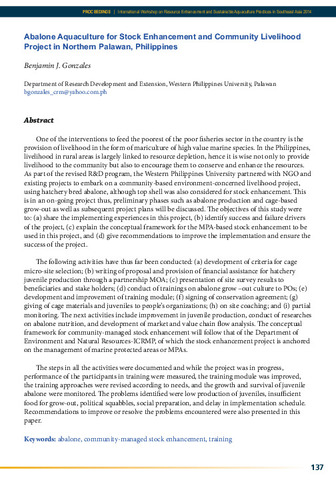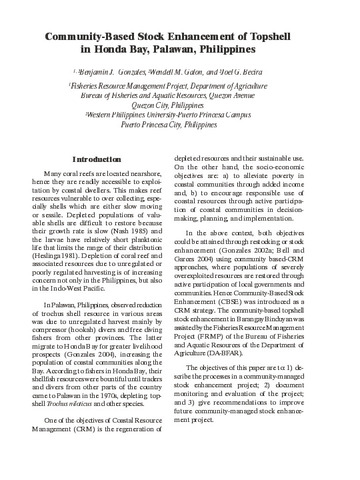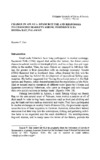Knowledge, gender, and resources in small-scale fishing: The case of Honda Bay, Palawan, Philippines

View/
Request this document
Date
2003Author
Page views
246Metadata
Perlihat publikasi penuhCited times in Scopus
Share
Abstract
The coastal zone is a place of intense activity where resources, users, and resource-use practices interact. This case study of small-scale fisheries in Honda Bay, Palawan, Philippines shows that resources, space, and gender are intertwined. The study was conducted between June 1997 and July 1998. The data were gathered using free listing, pile sort, ranking, resource mapping, and key informant interviews. The results showed that women's knowledge about fishery resources and their fishing activities are associated with the intertidal zone whereas men's knowledge is associated with coral reefs. In classifying fishery resources, appearance is the main consideration for women whereas a combination of appearance, habitat, and type of fishing gear is the consideration used by men. Market price is very important because of its dependence on the demand of the export market as well as the local market. Women dominate the buying of fishery products. Many women market their husband's catch, process fish, or gather shells and sea cucumber for sale. Among the fishing households, type of fishing gear provides an indication of socioeconomic standing. This paper concludes that access to resources is shaped by gender and age. The differences in resource knowledge possessed by men and women lead to differential access to fishery resources. In addition, the differences in socioeconomic status also influence resource access. The socialization of children into fishing reinforces the gender division of labor and space in the coastal zone.
Suggested Citation
Siar, S. V. (2003). Knowledge, gender, and resources in small-scale fishing: The case of Honda Bay, Palawan, Philippines. Environmental Management , 31(5), 569-580. https://doi.org/10.1007/s00267-002-2872-7
Subject
artisanal fishing  ; coastal zone
; coastal zone  ; coral reefs
; coral reefs  ; fishery products
; fishery products  ; fishery resources
; fishery resources  ; fishing gear
; fishing gear  ; labour
; labour  ; pricing; sex
; pricing; sex  ; socioeconomic aspects
; socioeconomic aspects  ; sociology
; sociology  ; women
; women  ; fishing
; fishing  ; coastal zone management
; coastal zone management  ; Holothuroidea
; Holothuroidea  ; Philippines, Palawan, Palawan I., Honda Bay; Natural resource management; Philippines
; Philippines, Palawan, Palawan I., Honda Bay; Natural resource management; Philippines 
 ; coastal zone
; coastal zone  ; coral reefs
; coral reefs  ; fishery products
; fishery products  ; fishery resources
; fishery resources  ; fishing gear
; fishing gear  ; labour
; labour  ; pricing; sex
; pricing; sex  ; socioeconomic aspects
; socioeconomic aspects  ; sociology
; sociology  ; women
; women  ; fishing
; fishing  ; coastal zone management
; coastal zone management  ; Holothuroidea
; Holothuroidea  ; Philippines, Palawan, Palawan I., Honda Bay; Natural resource management; Philippines
; Philippines, Palawan, Palawan I., Honda Bay; Natural resource management; Philippines 
Koleksi
- AQD Journal Articles [1222]
Related items
Showing items related by title, author, creator and subject.
-
Abalone aquaculture for stock enhancement and community livelihood project in northern Palawan, Philippines
Gonzales, Benjamin J. (Aquaculture Department, Southeast Asian Fisheries Development Center, 2015)One of the interventions to feed the poorest of the poor fisheries sector in the country is the provision of livelihood in the form of mariculture of high value marine species. In the Philippines, livelihood in rural areas ... -
Community-based stock enhancement of topshell in Honda Bay, Palawan, Philippines
Gonzales, Benjamin J.; Galon, Wendell M.; Becira, Joel G. (Aquaculture Department, Southeast Asian Fisheries Development Center, 2006)In Palawan, Philippines, observed reduction of trochus shell resource in various areas was due to unregulated harvest mainly by compressor (hookah) divers and free diving fishers from other provinces. The latter migrate ... -
Change in Aplaya: resource use and responses to changing markets among fisherfolk in Honda Bay, Palawan
Siar, Susana V. (University of San Carlos Publications, 2003)



